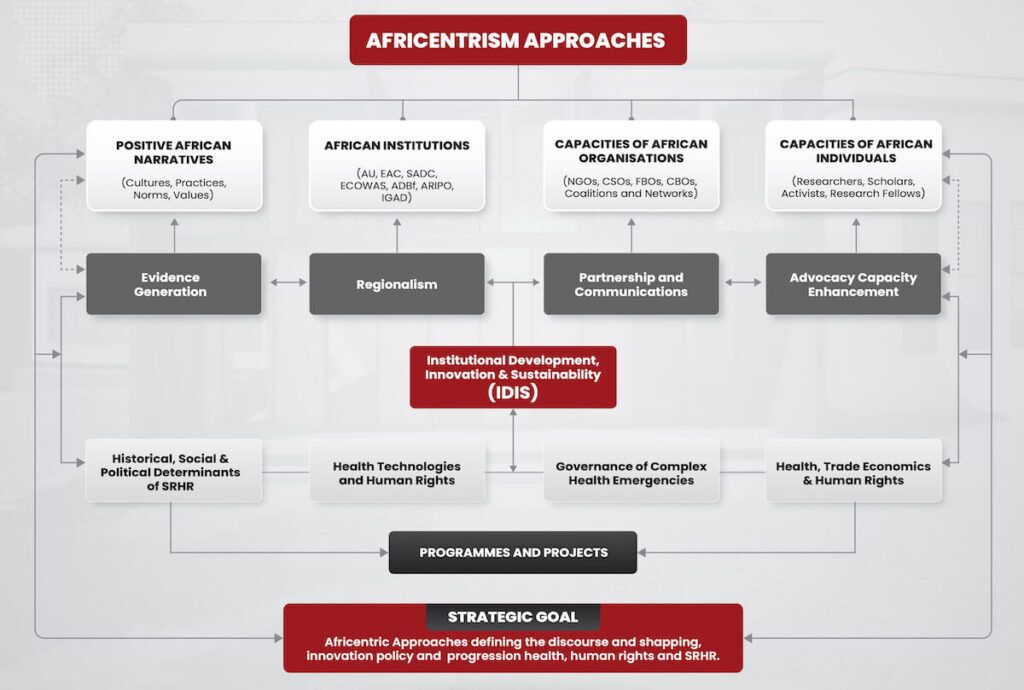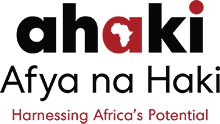Our Philosophy
Ahaki uses Africentric approaches within a national, regional, Pan-African and global context to achieve its aims.
Ahaki interprets Africentrism through the lens of;
- Positive African narratives;
- Engaging the African regional and sub-regional institutions like the African Union (AU), East African Community (EAC), Southern African Development Community (SADC), Africa Regional Intellectual Property Organization (ARIPO) Inter-governmental Authority on Development (IGAD);
- Supporting and collaborating with African NGOs; and
- Engaging African experts and individuals on African perspectives with in global conversations on health, human rights, and the historical, social and political determinants of SRHR.

Our Africentrism approaches focus on Four Pillars;
Pillar 1: Positive African Narrative
This pillar is grounded on the notion that communities are depositories of knowledge and as thus endorses positive African narratives that promote human rights and social justice. We decolonize research from a Western notion by brining to the fore African narratives. We revisit African cultures, practices, norms and values and extract the positives aspects that advance the discourse on health, human rights and SRHR. The aim is to ensure that Africa tells its own stories grounded in its rich history / herstory that has over the years been reported by different scholars from different jurisprudence without the lens of appreciative questioning. This pillar helps to reimagine African narratives that contribute to the current global discourse on health, human rights and SRHR. It also enables the infusion of Africentric analyses as an essential building block to achievement of equitable access to health and SRHR. And more importantly this pillar reconciles African cultures with constitutionalism, basic human rights principles and social justice.
Pillar 2: African Institutions
At Ahaki, we believe in the power of African institutions and their potential in informing the discourse on health, human rights and SRHR. These African regional and sub-regional institutions include: The African Union (AU), The East African Community (EAC), The Southern African Development Community (SADC), The Economic Community of West African States (ECOWAS), The Central African Economic and Monetary Community (CEMAC), Arab Maghreb Union (UMA), Common Market for Eastern and Southern Africa (COMESA), Community of Sahel–Saharan States (CEN–SAD), Economic Community of Central African States (ECCAS) and, The Intergovernmental Authority on Development (IGAD). We also believe in pursuing greater rights by engaging with African regional human rights mechanisms such as: The African Commission on Human and People’s Rights (ACPHR), The African Court of Justice and Human Rights (ACJHR) and East African Court of Justice (EACJ) among others. We work with these institutions and mechanisms to identify opportunities that contribute to policy decisions and directions that impact on African societies.
Pillar 3: Institutional Capacity Enhancement for African Organisations
Ahaki focuses on building accountable and sustainable African-based Civil Society Organizations (CSOs) that undertake strategic advocacy work and amplify the African narratives to inform the work on health, human rights and SRHR. The capacity enhancement interventions include: institutional strengthening on resource mobilization, regional strategic litigation, advocacy capacity assessments for CSOs and; advocacy on health, human rights and SRHR. Ahaki also focuses on supporting African CSOs to identify resources that are critical in advancing the work on health, human rights and SRHR. Through creating agency, we believe that African CSOs can acquire the potential to highlight African problems and solutions that enhance communities in Africa. This enables African CSOs to engage on African problems through engaging Africans.
Pillar 4: Capacities of African Individuals
Ahaki provides opportunity and space for African scholars (active and retired scholars), researchers, think-tanks, retired experts, activists and communities to undertake work that expounds the African narratives to influence African policy directions through evidence-based engagements. Ahaki also targets practitioners that are already focused on health, human rights and SRHR within the public/government sector, academia, CSO sector and private sector and capacitates them through experience sharing, think tanking, fellowships and mentorship. Ahaki is the space for individuals to focus on research and alternative thinking, a free space for contestation.
Our Areas of Work
Our areas of work are achieved through three Key Interventions as elaborated below;
Evidence generation:
We conduct research on health, human rights and SRHR with the aim of building onto the body of knowledge that influences policy. Through appreciative questioning, we design and implement a research agenda that incorporates indigenous knowledge in advocacy best practices. Our approach integrates participation, social mobilization, community-based research, partnerships and collaborations across African and global institutions.
Advocacy Capacity Enhancement:
We enhance advocacy capacities of stakeholders in health, human rights and SRHR through our Africentric approaches. Using our robust infrastructure and strategic collaborations at the national, regional and global level, we deliver practical and relevant trainings. Our focus areas under this include: development of curricular and course modules, customized trainings, fellowship programs, mentorships, exchange learning and knowledge repository.
Partnership and Collaboration:
Ahaki partners and collaborates with various institutions at national, regional and global levels to advance the agenda on health, human rights and SRHR. Through cross learning, coalition building, experience sharing and leveraging on expertise, Ahaki’s work builds solid relationships that advance the the potential of Africa and Africans to influence the agenda in health, human rights and SRHR.
Regionalism
The regionalism sub-strategy is anchored under pillar number two (2) of Ahaki’s Strategic Plan (SP) which is focused on “African Institutions” and their respective Human Rights Mechanisms at the regional and sub-regional levels. This work is realized through pooling resources, ideas, and coordinating solutions to create more effective planning and implementation of strategies for regional institutions to advance health, Human Rights and Sexual Reproductive Health and Rights (SRHR) within Africa.
